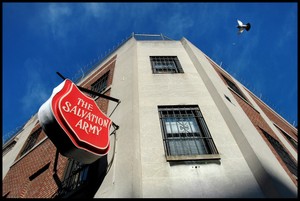Please note, this website is NOT affiliated with the Salvation Army! No phone number displayed on our pages will connect you with the Salvation Army. For more information about the Salvation Army's addiction mission visit their website.
The Salvation Army is a faith based Christian organization with a mandate to helping the unfortunates of society, including the homeless and those suffering with addictions to drugs or alcohol.
An international organization, the Salvation Army boasts more than 4 million members in 100 countries throughout the world.
Salvation Army residential drug rehab programs are free for those with financial need, and may require some payment from those that can afford it. The program costs are subsidized through yearly charitable appeals (especially at Christmas) and as well through the proceeds of the Salvation Army stores, which are more often than not staffed by recovering addicts participating in the program.
Most participants in The Salvation Army's Adult Recovery Programs have already received some form of supervised medical detox and often a limited duration of inpatient rehab, but continue to benefit from a long and structured stay within a Salvation Army drug rehab.
How Does a Salvation Army Rehab Work?
The only real requirement for admission into a Salvation Army drug rehab program is that you be sober at the time of entry, that you be willing to participate in a faith based recovery program and also be willing to pay your way through the rehab by working in the Salvation Army stores and peripheral programs.
Residents in a Salvation Army drug rehab, which run for anywhere from 3 months to 9 months in duration, are provided with food, clothing and accommodation, and given access to treatment, bible study, education and work training programs.
Because the Salvation Army is an evangelical Christian organization, faith based methods of recovery are emphasized. The 12 steps of alcoholics anonymous or narcotics anonymous are customarily employed, and recovering addicts will participate in daily 12 steps style or other group recovery meetings. Additionally, bible and scripture study with an emphasis on readings related to spiritual healing and recovery are emphasized. Christian counseling with church leaders and Sunday worship are also encouraged.
Recovering addicts participating in the programs are additionally offered the opportunity for general education courses (high school equivalency diplomas or even higher education courses, for example) or other work related training.
Works as therapy is emphasized in a Salvation Army drug rehab, and recovering addicts are required to help offset the costs of their stay by working in the Salvation Army stores, driving Salvation Army trucks, or otherwise working within the organization. The Salvation Army philosophy of recovery calls for work therapy as a way to re build needed employment skills and personal responsibility, as well as a way to transition safely back into the world of employment and temptation having already learned how to work within a structured and temptation free environment.
Is a Salvation Army Rehab Right For You?
The Salvation Army, although a charitable non profit organization devoted to the provision of affordable or no charge drug and alcohol rehabilitation to those in need, has come under fire for it's discriminatory hiring practices towards gays and lesbians.
The Salvation Army considers same sex relationships immoral and homosexuality a sin, and has does not hire people it feels are morally unfit. The Salvation Army recovery programs are not likely suitable programs for the drug rehabilitation needs of the gay, lesbian and transgendered communities.
For those in financial need, the Salvation Army is there to help. With low cost or free access to long term rehabilitation, the program offers hope to the otherwise hopeless, and has a long tradition of helping the unfortunates of society. Because the treatment is both intensive and long lasting, the Salvation Army offers men and women with severe addictions sufficient periods of sobriety and a way to transition back into the world of temptation over a long period of treatment.
Through work education, spiritual teachings and other educational programming, the Salvation Army strives to better the odds of success and sobriety as it preaches its faith based Christian approach to recovery.
There are Salvation Army Adult Recovery Centers in virtually all major cities of the United States, and most offer treatment for no or very little cost. For more information about the Salvation Army's addiction mission, including locations near you, visit their website.
Page last updated Jan 02, 2018


